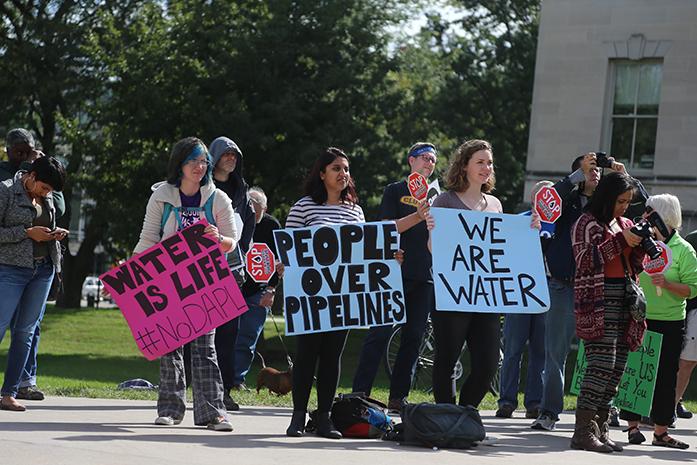Social change in a peaceful manner, in the mode of Gandhi, was the subject of a local workshop on Feb. 24.
PEACE Iowa hosted a Nonviolent Activism Workshop to discuss the opportunity to create social change. The workshop focused on the teachings of Gandhi’s Satyagraha.
Satyagraha, or “holding firmly to truth,” is a peaceful means of activism and the practice of passive political resistance. This was most notably implemented by Mahatma Gandhi against British rule in India.
Karen Nichols, winner of the 2017 PEACE Iowa Scholarship and the founder of Iowans for Public Education, spoke at the event. Nichols attended the Satyagraha Institute in South Dakota, where she was educated in Gandhi’s practice and the methods of nonviolent activism.
“Taking two weeks away from the rest of my life in this beautiful, natural area to just think about this stuff and what my place was in it all was … amazing,” she said.
Nichols prepared a presentation that examined the practices of Gandhi, Gene Sharp, and Jamila Raqib, as well as the ideas of Kingian Nonviolence. The presentation was accompanied by small-group discussions and skits demonstrating ways to handle conflict.
PEACE Iowa is a grass-roots organization in eastern Iowa that focuses on international peace. Group director Lori Nelson said the organization holds a workshop once a year focusing on nonviolence, among other events.
Along with learning the meanings of Satyagraha, attendees of the workshop participated in meditation, discussion of current conflicts, and exploration of ways to peacefully get involved in social change.
Ruth Zanoni, an activist and participant in the workshop, noted the importance of nonviolent activism.
“It means showing up, and being present, and listening to other people,” she said. “And, hopefully, finding common ground so we can move forward together.”
Participants read a passage from the book Satyagraha and the Inner Life, by Clark Hanjian, and discussed the importance of patience in activism. The reading was followed by a discussion led by Nichols that centered on the effect of patience on social change and methods to remain patient in times of struggle.
Lore Baur, an activist and participant in the workshop, discussed her experiences and the importance of patience in activism, though it sounds counterintuitive.
“We’re going to have conflict. How do we conduct it?” she said. “The idea of engaging rather than waiting, which has that interesting … paradox of patience … But at the same time, acting.”
The event centered on the collaboration of activists and the combination of ideas to implement Satyagraha in everyday forms of social change. Nichols noted the unique angle each activist brings to a conflict and the importance of combining different ideas in order to achieve peaceful change.
The workshop concluded with participants sharing ideas for future work of peaceful activism based on issues occurring in the world. The event gave opportunities to grow personally in Satyagraha in addition to growing with the community of Iowa City.
“Learning from one another, that’s probably what I’m most excited about is just to learn from other people,” Baur said.



